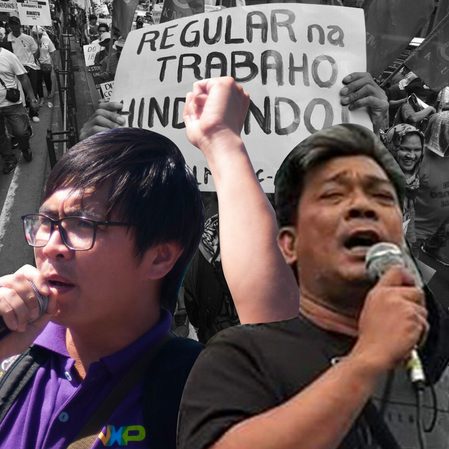This is AI generated summarization, which may have errors. For context, always refer to the full article.
‘The Philippine government’s sinister and at times deadly practice of ‘red-tagging’ has become a serious threat to labor rights in the country,’ says Bryony Lau, deputy Asia director at Human Rights Watch
MANILA, Philippines – One Monday afternoon in April 2023, Noel Baron, union president at Ebara Pumps Philippines Inc., saw a motorcycle without a license plate parked near his home in Cabuyao, Laguna. Two men in civilian clothes were onboard.
Baron’s heart “skipped a beat” due to the prevalence of riding in tandem killings in the Philippines, especially for activists like him.
Later on, the men identified themselves as “Brian” and “Mendoza” from the National Task Force to End Local Communist Armed Conflict (NTF-ELCAC), the government’s main anti-insurgency arm marred with red-tagging allegations. Red-tagging is the act where people in power link individuals to communist groups.
Baron said the men told him that they visited to reiterate the NTF-ELCAC, the police, and the military’s message that union leaders from their company should refrain from joining activities organized by the progressive labor rights group Kilusang Mayo Uno (KMU). It was the ninth time he was visited by security forces since 2022, according to the labor leader.
“They said I’m on a watchlist for supposed involvement with the NPA (New People’s Army),” Baron said. “They said I ought to clear my name.”
Baron also said that barangay officials or village watchmen (tanod) accompanied security forces in the prior visits to his home. According to him, their leaders and members started to experience harassment from the government ever since their group became active in fighting for their labor rights.
“My fellow officials are also visited in their homes,” Baron said. “Government agents would use former union officers against us, for example by launching a signature campaign against me. As a result, several of us have left the unions so that only two of us are left.”
The labor leaders’ families were also affected by the government’s harassment: “They told my wife and my children to convince me to abandon the union…. Our lives have been upended by the harassment.… The fear and anxiety never went away.”
To fight back against red-tagging and harassment, Baron and other union leaders filed complaints with the Commission on Human Rights. They also asked for the NTF-ELCAC’s defunding and disbandment.
Baron is only one of the several labor leaders mentioned by the Human Rights Watch (HRW) in its report about the red-tagging and harassment of labor leaders in the Philippines under the administration of President Ferdinand Marcos Jr.
Withdrawal from unions
Aside from continued threats, red-tagging also pushed labor leaders in the Philippines to withdraw from their unions, according to the HRW’s report. The human rights group came up with their findings after interviewing 14 union leaders and workers, and labor advocates in Calabarzon.
“It’s clear to us that the Philippine government is using red-tagging to prevent workers from organizing and unionizing,” KMU secretary general Jerome Adonis said in the report.
Based on KMU’s data, at least 72 union leaders and members have been killed in the Philippines since 2016. The continued red-tagging also caused two unions to end their affiliation with KMU and the reduction in the number of unionized workers in the country, according to Kamz Deligente, deputy director of the Center for Trade Union and Human Rights.
“The Philippine government’s sinister and at times deadly practice of ‘red-tagging’ has become a serious threat to labor rights in the country,” Bryony Lau, deputy Asia director at Human Rights Watch, said. “President Ferdinand Marcos Jr. should direct officials to end this abusive practice and ensure that government authorities uphold the rights of workers to organize and bargain collectively.”
Killings of labor leaders in the Philippines also remain unsolved. After the killing of labor leader Manny Asuncion during the “Bloody Sunday” operation in March 2021, a murder complaint was filed against the cops involved in the operation. However, the complaint was later dismissed by the Department of Justice due to insufficiency of evidence.
The International Labour Organization (ILO) conducted a mission to the Philippines in 2023 and found that the government had done “very little” to address labor problems in the country. As a response, Marcos signed his Executive Order 23 “to strengthen the coordination and facilitate the resolution of labor cases in the country.” (READ: For 8th straight year, Philippines among 10 worst countries for workers)
However, at least four union activists were killed since the ILO mission, according to the HRW. – Rappler.com




































